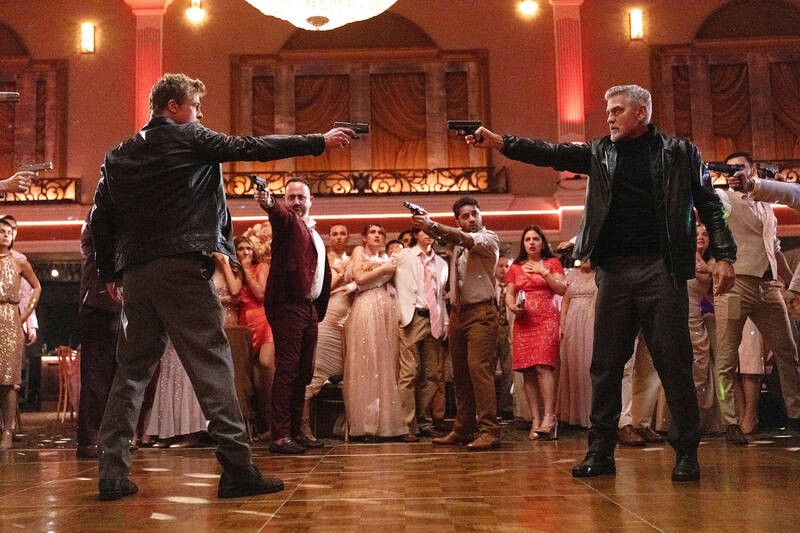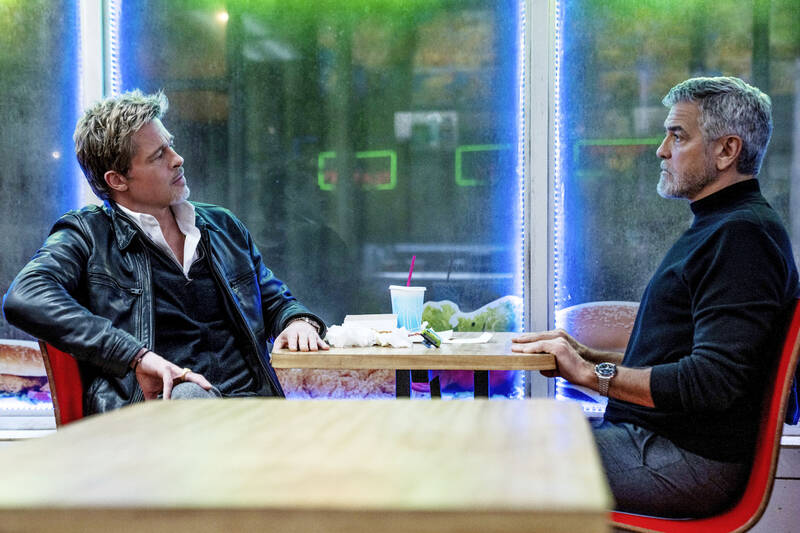The overriding tension in Wolfs, starring George Clooney and Brad Pitt as rival fixers brought in to clean up the same crime, isn’t so much the threat of police arrest or Albanian mob assassination — both of which are concerns. It’s that Clooney and Pitt aren’t pals.
The two start out as strangers to one another. It’s a testament to Clooney and Pitt’s jovial on-and-off screen chemistry, and their bond in shared movie-star charisma, that it’s genuinely discombobulating to hear Pitt tersely call Clooney “sir” as he does in the opening scenes of Jon Watts’ winning, clever caper.
Pitt and Clooney first acted together in 2001’s Ocean’s Eleven. And like that remake riff on the Rat Pack original, Wolfs is as much, if not more, about its movie stars as it is anything else. The movie’s appeal is mostly in their easy charm and chemistry — the little eye rolls and games of one-upmanship that accrue until, finally, they’re buddies, like we want them to be.

Photos: AP
Clooney is 63 and Pitt is 60, and there are few bits about back pain and Advil in Watts’ film. But Wolfs is designed to show you that they can still, without ever really breaking a sweat, get the job done.
When their characters meet, they are both standing in the penthouse of a luxury New York hotel where a tough-on-crime district attorney (Amy Ryan) is in desperate need of a cover up. A young, nearly naked man is seemingly dead on the floor. She’s frantically searched her phone for a number once given for such emergencies. That brings the first never-named fixer (Clooney) to the door. Not long after, the second, also unnamed fixer (Pitt) knocks. After a moment of confusion, he points to a small camera at the ceiling. He’s been dispatched by the hotel owner (an unseen Frances McDormand) who doesn’t want any bad press.
The two fixers are spiritual descendants, you might say, from Harvey Keitel’s Winston Wolfe, the fast-driving cleaner of Pulp Fiction. Each is a specialist, supposedly the only man who can do what they do. Wolfs — with an awkwardly spelled title that represents the pained collaboration of these two solo freelancers — is a little bit like the pointing Spider-Men meme brought to life. Fitting, then, that it comes from Watts, director of the three Tom Holland Spider-Man films. He also wrote the script.

Photo: AP
There are more movies that Wolfs has some kinship with, too, like Tony Gilroy’s Michael Clayton, a high point for Clooney in which he played the clean-up man of a malicious law firm. Wolfs doesn’t measure up to anything like Michael Clayton — what does? — and isn’t trying to, anyway. This is more of an old-school movie-star-driven entertainment featuring two actors with skills as rarified as their characters’, the kind of movie that was once regularly at home in theaters but now has instead been built for the streaming era.
Informed that they have to finish the job together, the two fixers begin to go about the business of getting rid of the body. They eye each warily, disinterested in giving away any tricks of the trade. This mostly falls to Clooney’s character, whose creative way of lifting the body onto a luggage rack begins to earn the respect of Pitt’s character.
They turn out to have much, maybe everything, in common. Slowly, reluctantly, they inch toward a partnership. It’s a credit to Watts’ keen sense of rhythm and his stars’ subtlety that it more or less takes the whole movie to get there. Once outside the hotel, Wolfs unspools over the course of one night, shot sleekly in the shadows of downtown Manhattan by cinematographer Larkin Seiple.
Things get a jolt when the body in question turns out to be alive, and kind of a hoot, too. The kid, credited only as “Kid,” is roused from a drug-induced stupor, and quickly, in tighty whities, goes escaping down the street, forcing the two fixers on an extensive chase leading up to the Brooklyn Bridge. The kid is played with a lot of goofy moxie by Austin Abrams (Euphoria, The Walking Dead), and his account of how he got into this mess, delivered in a cheap motel, may be the film’s best sequence. Along with Sean Baker’s upcoming Anora, it’s turned into a surprisingly good season for New York nocturnal odysseys propelled by mop-haired kids who end up in Brighton Beach.
But the kid’s perspective on his two captors also pushes Wolfs along. He’s naive enough to think they’re his friends, even though they would seem duty-bound to dispatch him. Regarding Clooney and Pitt, both in leather jackets, from the back seat of the car, he otherwise correctly assesses them, calling them “like the two coolest people I’ve ever met.”
Thankfully, someone has come to the not-hard-to-deduce realization that Clooney and Pitt are good together. A sequel has already been announced. Wolfs turns out to be both the beginning and the coda of a beautiful friendship.

We lay transfixed under our blankets as the silhouettes of manta rays temporarily eclipsed the moon above us, and flickers of shadow at our feet revealed smaller fish darting in and out of the shelter of the sunken ship. Unwilling to close our eyes against this magnificent spectacle, we continued to watch, oohing and aahing, until the darkness and the exhaustion of the day’s events finally caught up with us and we fell into a deep slumber. Falling asleep under 1.5 million gallons of seawater in relative comfort was undoubtedly the highlight of the weekend, but the rest of the tour

Youngdoung Tenzin is living history of modern Tibet. The Chinese government on Dec. 22 last year sanctioned him along with 19 other Canadians who were associated with the Canada Tibet Committee and the Uighur Rights Advocacy Project. A former political chair of the Canadian Tibetan Association of Ontario and community outreach manager for the Canada Tibet Committee, he is now a lecturer and researcher in Environmental Chemistry at the University of Toronto. “I was born into a nomadic Tibetan family in Tibet,” he says. “I came to India in 1999, when I was 11. I even met [His Holiness] the 14th the Dalai

Following the rollercoaster ride of 2025, next year is already shaping up to be dramatic. The ongoing constitutional crises and the nine-in-one local elections are already dominating the landscape. The constitutional crises are the ones to lose sleep over. Though much business is still being conducted, crucial items such as next year’s budget, civil servant pensions and the proposed eight-year NT$1.25 trillion (approx US$40 billion) special defense budget are still being contested. There are, however, two glimmers of hope. One is that the legally contested move by five of the eight grand justices on the Constitutional Court’s ad hoc move

Stepping off the busy through-road at Yongan Market Station, lights flashing, horns honking, I turn down a small side street and into the warm embrace of my favorite hole-in-the-wall gem, the Hoi An Banh Mi shop (越南會安麵包), red flags and yellow lanterns waving outside. “Little sister, we were wondering where you’ve been, we haven’t seen you in ages!” the owners call out with a smile. It’s been seven days. The restaurant is run by Huang Jin-chuan (黃錦泉), who is married to a local, and her little sister Eva, who helps out on weekends, having also moved to New Taipei